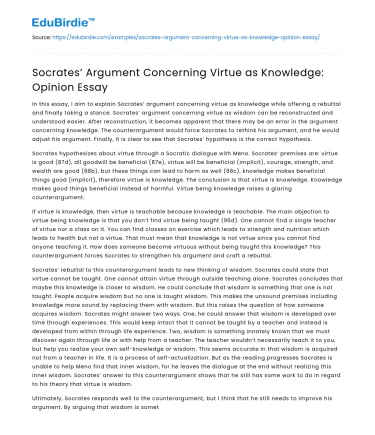In this essay, I aim to explain Socrates’ argument concerning virtue as knowledge while offering a rebuttal and finally taking a stance. Socrates’ argument concerning virtue as wisdom can be reconstructed and understood easier. After reconstruction, it becomes apparent that there may be an error in the argument concerning knowledge. The counterargument would force Socrates to rethink his argument, and he would adjust his argument. Finally, it is clear to see that Socrates’ hypothesis is the correct hypothesis.
Socrates hypothesizes about virtue through a Socratic dialogue with Meno. Socrates’ premises are: virtue is good (87d), all goodwill be beneficial (87e), virtue will be beneficial (implicit), courage, strength, and wealth are good (88b), but these things can lead to harm as well (88c), knowledge makes beneficial things good (implicit), therefore virtue is knowledge. The conclusion is that virtue is knowledge. Knowledge makes good things beneficial instead of harmful. Virtue being knowledge raises a glaring counterargument.
Save your time!
We can take care of your essay
- Proper editing and formatting
- Free revision, title page, and bibliography
- Flexible prices and money-back guarantee
If virtue is knowledge, then virtue is teachable because knowledge is teachable. The main objection to virtue being knowledge is that you don’t find virtue being taught (96d). One cannot find a single teacher of virtue nor a class on it. You can find classes on exercise which leads to strength and nutrition which leads to health but not a virtue. That must mean that knowledge is not virtue since you cannot find anyone teaching it. How does someone become virtuous without being taught this knowledge? This counterargument forces Socrates to strengthen his argument and craft a rebuttal.
Socrates’ rebuttal to this counterargument leads to new thinking of wisdom. Socrates could state that virtue cannot be taught. One cannot attain virtue through outside teaching alone. Socrates concludes that maybe this knowledge is closer to wisdom. He could conclude that wisdom is something that one is not taught. People acquire wisdom but no one is taught wisdom. This makes the unsound premises including knowledge more sound by replacing them with wisdom. But this raises the question of how someone acquires wisdom. Socrates might answer two ways. One, he could answer that wisdom is developed over time through experiences. This would keep intact that it cannot be taught by a teacher and instead is developed from within through life experience. Two, wisdom is something innately known that we must discover again through life or with help from a teacher. The teacher wouldn’t necessarily teach it to you, but help you realize your own self-knowledge or wisdom. This seems accurate in that wisdom is acquired not from a teacher in life. It is a process of self-actualization. But as the reading progresses Socrates is unable to help Meno find that inner wisdom, for he leaves the dialogue at the end without realizing this inner wisdom. Socrates’ answer to this counterargument shows that he still has some work to do in regard to his theory that virtue is wisdom.
Ultimately, Socrates responds well to the counterargument, but I think that he still needs to improve his argument. By arguing that wisdom is something innate, then he would need to explain how wisdom develops within the person. He would also need to explain what someone really possesses when they possess wisdom. I suspect there are varying degrees of wisdom, and he would need to address someone has attained wisdom in its fullest degree. Also, if a teacher is unable to help someone realize this innate wisdom, then how does someone do it? Perhaps life draws it out of them, but surely there are examples of two people leading the same life with differences in wisdom. His idea that wisdom guides certain good things to being beneficial is correct and sound. The question remains how someone develops or realizes this wisdom.
Socrates’ hypothesis on virtue as wisdom is sound, but it raises future dilemmas about wisdom. His argument is valid and sound, and he makes good sense of the interaction of wisdom and things such as wealth, strength, and courage. He also accurately says that wisdom is something within, but he fails to answer some of the questions that arise with that claim.






 Stuck on your essay?
Stuck on your essay?

